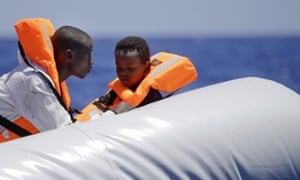I have a cousin who walked across the Sahara desert to get to Europe. In another age and with another skin, he might have been a celebrated explorer: a Mungo Park or a Mary Kingsley or even a David Livingstone. In the 21st century he was just another black immigrant trying to make it over the fence.
There was swashbuckling danger, treachery in the sand dunes and comrades buried just before they sighted the straits of Gibraltar. It was a yarn worthy of Robert Louis Stevenson, an epic befitting of Homer, but the Italian immigration officer who deported him had no interest in the tale. He was sent back to Nigeria, flying over the desert he had crossed on foot, a journey of weeks reduced to hours.
When I met my cousin, he was planning to do the trip again. He was neatly dressed; in possession of a mobile phone and polished leather shoes. He was not an African who could be used for any charity appeals. His cheeks and clothing were too prosperous to elicit pity. My cousin was not fleeing from a war or persecution. Neither was he a displaced person nor was he starving. There are many who flee to Europe for these reasons but these were not my cousin’s problems.
He wished to live in Europe simply because he wanted a better life. Just as migrants from northern England migrate to London in search of a better life. Just as migrants from London move to Australia. Just as migrants from Poland move to England. And so on and so forth, in an endless cycle of human aspiration.
There has been a lot of speculation about the man who fell from the sky a few days ago, his corpse plummeting through the clouds and crashing on to a suburban London rooftop. Maybe he was running from a war. Maybe he wasn’t. Maybe he was fleeing religious persecution. Maybe he wasn’t. For centuries, it’s been a part of life. If you don’t like where you live, you don’t like your neighbours, if you’re bored of your small town and desperate for adventure; you want the gold of Eldorado or the tea in China or the spices of India or the humans of West Africa; or you’ve just always wanted to know the source of the Nile, you roll up your backpack, step out of your kraal, your arrondissement or your burgh and you set off into the unknown.
There are no fences high enough to stop humans from aspiring.
Yet increasingly, the movement of those from certain parts of the world is truncated. Only a select few with certain hues of passport can move freely on this Earth. Only the elect can travel and work with ease anywhere on the planet. Only the favoured can go on gap years and travel to expose themselves on sacred mountains. For the rest, there is the frustrating, humiliating, extortionate process of the visa. Britons can visit 173 countries without one. Nigerians can visit 44. As Mighty Shadow, the Trinidadian calypsonian sang:
Nowadays you enter a strange land, they call you an alien. /
You gotta explain to immigration, what is your intention. /
Columbus didn’t have to do that. It just didn’t make no sense. /
His authority was a broadhat and his passport was violence.
If they aren’t starving and they have a stable government and they have radios and smartphones, why on earth are they trying to come here? This seemed to be the note of incredulity running through an article I read recently. As if an Englishman would count his life a success because he had a mobile phone and lived in a country where a government transitioned peacefully in a democratic election. As if the highlight of an American’s life would be switching on a radio and hearing sound. This is the reality of global capitalism. We drink the same Coca-Cola. We use the same internet. We watch the same YouTube.
And we want what you want.
Why is it so frightening to hear that? We are never content. We all want a better job market, better weather, cheaper housing, better grammar schools, a lower cost of living. It is the human condition. Why are some allowed to travel in search of better opportunities and others are not?
Enshrined in the American Declaration of Independence is the right of every man to “life, liberty and the pursuit of happiness”. The reality is, however, that if you’re from a certain part of the world you can cross borders to pursue your happiness. But if you’re from another part of the world, you can’t.
Europe especially, with its recent history of brutal, rapacious empires, should know about wanting and travelling to fulfil wants, and being desperate enough to try and try again. So desperate was Hernando Cortés to take the riches of Mexico that he dismantled his ships to stop his troops from turning back. So desperate were the American founding fathers for religious freedom that they set sail to a place so alien they called it the “New World”. So desperate was my cousin for a job that paid in foreign exchange that he walked across a desert, dehydrated and half delirious. And so desperate are the British for sunshine and year-round barbecues that they risk deep-vein thrombosis on long-haul flights to Australia.
There are no fences high enough to stop humans from aspiring. There are no oceans wide enough to stop us from dreaming. Open the world more equitably so we all may walk freely. Or close the borders and let each one return to his house and see how much poorer and drearier and darker the world is when we all have to stay home.
